- Home
- Ninie Hammon
Blue Tears Page 8
Blue Tears Read online
Page 8
No one spoke then, just looked at her.
“I can’t think of any better way to do it, either. I’ll just … show up, and hope I don’t scare her to death.” She took a breath. “And scare Bethany to death, too.”
“Then you just gonna tell her, oh by the way, that she’s got to drop her life and hop on a plane with you back to West Virginia — before nightfall?”
Bailey bristled. “What else can I do when I know—?”
Brice held up his hand.
“This is that battle plan that’s going to fall apart as soon as the first shot is fired. If someone I knew and trusted told me there was a bomb in my house — I’d drop everything and run! If Bailey can convince her there’s real danger … of course she’ll run.”
“Yeah … but truth is Mikhailov is a red herring here. Course it ain’t safe for her to stay in Boston once Mikhailov finds out about Bailey, but right now, he don’t know. If we b’lieve them portraits — and we all do — then we know it ain’t Mikhailov’s gonna kill her. She gonna die in a fire. Ain’t no way in the world to pour out a story like that and x’pect somebody to swallow it all in one gulp.”
Bailey had already figured out that part.
“Mikhailov, Witness Protection Program, Bailey’s not dead — those are big enough body slams. The painting … nope, not going there. That’s a story for another day. I’ll convince her that she — and Bethany — are in so much danger from Mikhailov that she has to run.”
They all sat back in their seats then, thinking their own thoughts. Bailey’s bounced from María back to Bethany and back to María again like a tennis match.
If Bailey let herself consider that in — no, she absolutely would not look at her watch again! She had looked at it so often today she was wearing the numbers off the face. In some indefinite amount of time, a few hours, she would see Bethany.
“… and I put the peaches she likes in the diaper bag with the rice cereal because there’s only one brand …”
Jessie is babbling. She knows she’s babbling but she can’t seem to stem the tide of words. Because when she stops talking, she’s going to have to hand Bethany to María, turn around and walk out the door without her and she keeps backing up from that moment like drawing her hand away from a flame.
“Jessie, we need to go.”
“She puts everything in her mouth now, everything she finds on the floor, so—”
“Look around, Bailey. I’ve stripped the whole apartment bare. I’ve put those plastic cap things in all the outlets, and those other things on the cabinet drawers in the kitchen so she can’t open them, and there’s not an object anywhere on the floor in this whole apartment smaller than a sperm whale.”
María grins, the smile Jessie loves, showing her television-commercial white teeth. When she smiles like that, she’s beautiful.
“I got this.” María holds out her arms to Bethany.
The little girl leans out of Jessie’s embrace with her arms out, too. She adores her Aunt “ee-ah.” She hasn’t yet gotten the M sound on the front of the word.
Instinctively, Jessie leans back, holding the child away.
“Jessie …” Aaron turns his smile on María.
“I don’t know if I told you, but I have this arrangement with the airlines. If I’m not there when the plane takes off, they leave without me.” He turns back to Jessie. “We have to go.”
María lifts Bethany out of Jessie’s arms, and Aaron literally propels Jessie to the door. She turns and blows Bethany another goodbye kiss.
“I’ll be back to get you soon, sweetheart. I promise.”
That upsets the child. The note of something like desperation in Jessie’s tone is unsettling. She senses her mother’s reluctance and her face crinkles. She holds her arms out to Jessie and starts to cry.
“Will you two get out of here before she has a total meltdown. We’ll be fine.”
Aaron takes Jessie by the shoulders and literally shoves her out the door and closes it behind her.
She can hear Bethany behind the door crying. The sound breaks her heart.
Bailey looked out the window of the plane at the puffy white clouds below and the land so far beneath them there was nothing discernible on it.
“I’ll be back to get you soon, sweetheart,” she whispered under her breath. “I promise.”
Chapter Fifteen
The sidewalk had been shoveled and salted, removing whatever remained from the blizzard-that-fizzled the day before, the storm that somehow missed Boston almost entirely, regardless of the weather forecasters’ dire predictions.
The grit crunched under Bailey’s shoes as she walked toward the last red building on this side of the block. María’s apartment occupied the whole top floor of the two-story that had once been a family home, so it was a good-sized place.
She found herself walking slower and slower the nearer she got to the building.
She couldn’t wait to get there. Every fiber of her being was screaming for her to break into a dead run.
Except, she didn’t really want that at all. She wanted time to stand still, another few minutes to catch her breath, to still her pounding heart, to think of something better to say than, “Hi. I’m not dead.”
She passed the house next to the one where María and Bethany — Bethany! — were inside right this minute. She was by then walking so slow she was barely making any progress at all. Finally, she stopped altogether and just stood there, staring up at the building. There was a Christmas tree in the front window.
María unloaded the sack of groceries hurriedly. She had stood in line a hundred years at the grocery store. You’d think all those people would have bought provisions before what the news was now calling the blizzard-that-fizzled, and that they’d have so much bread/milk/eggs/coffee/whatever on hand they wouldn’t need to go to the grocery for a week.
Not.
All María wanted was her brand of coffee, Cafe Altura Ground Organic Coffee. It was an obscure brand that she couldn’t get at the convenience store on the corner or she’d never have ventured into the supermarket in the first place. Apparently, the Rapture had happened and everybody on the planet who could read had been zapped up to heaven, leaving behind only those unable to grasp the meaning of “Express Lane,” or fathom what “twelve items or fewer” could possibly mean.
Seriously?
She glanced out the window, hoping Mrs. Trimboni’s husband hadn’t pulled up and parked illegally on the street to let her and Bethany out early. Early was not a good thing today.
The street was totally empty. Not a person or vehicle anywhere in sight.
She’d better text the nanny and tell her not to come early. She punched the messages icon, then the little microphone. Unlike every other member of the human race with opposable thumbs, María McKessen couldn’t type a text.
“Hi, Mrs. Trimboni …” she began.
There was a knock at the door. A soft, almost tentative knock. Clearly, not Mrs. Trimboni, who banged on the door like the Gestapo, would have walked in without knocking if María didn’t keep the door dead-bolted and chain-locked.
She started for the door, hurrying to complete the text. “Early wouldn’t be a good thing today,” she said. “I’m running way behind.”
She didn’t bother looking through the peep hole, though parental programing was as sticky as gum on her shoe and she always heard the echo of her foster mother Mrs. Anderson’s warning: “You find out who it is before you open the door, missy. It could be anybody on the other side. A serial killer, maybe. An axe murderer.”
But the binocular lens in this door turned people into Fun House freaks with gigantic eyes and pointy heads. If the person on the other side of the door really looked like that, nobody’d let them in.
She unlocked the deadbolt and pulled the door open the distance of the chain as she finished the text. “Don’t bring Bethany home until five-thirty. I’m wrapping her presents.” She hit send and looked at the woman standing in th
e hall.
“Can I help you?”
All the plans Bailey’d made for what she was going to say went up in smoke the moment María opened the door, talking. Big surprise, that. Memories of María’s adorable babble welled up in her chest and almost choked her.
“… bring Bethany home until five-thirty. I’m wrapping her presents.”
Bethany’s presents!
She looked up at Bailey then.
“Can I help you?”
Bailey couldn’t speak. Her throat locked up tighter than a princess in a tower. All she could do was look, gobble up the adorable face.
Images flashed but didn’t really register.
… so much older …
… lost weight, too thin …
… short hair, it’s curly …
She saw only confusion on María’s face, and maybe she was running away from what she was seeing that couldn’t possibly be so. Bailey reached up and pulled her coat hood off her head, tried to smile and absolutely could not pull it off.
“María.” Her voice was hoarse and tear-clotted. “It’s me, sweetie. Bailey.”
The woman in the hallway just stood there, didn’t say anything. The light wasn’t good out there. The super could pinch the Indian head off a nickel and only used 40-watt bulbs in the fixtures in the common areas. Twenty-five watt when he could find them.
She was familiar, though, even in the shadows. Then she pulled the hood back off her hair.
Black hair, hanging in soft curls on her shoulders.
Shiny black hair, sparkling even in the dim light.
Then she spoke, said a word, maybe her name, but María didn’t catch it because a sudden roaring had erupted in her ears.
No … that was absurd.
“It’s me, sweetie. Bailey.”
Then María started to scream.
She was never able to order the sequence of events after that. She could hear someone screaming, but the person was down in a well and the sound was bouncing around and echoing.
She was suddenly hallucinating, had been dropped down into a dream world where there was a woman standing out in the hallway in front of her door, calling her name, calling her María.
She realized she was the one screaming when her throat felt raw and she clamped her hands over her mouth to stop the sound but it bled out through her fingers and went on and on.
Then Jason, a neighbor, was in the hallway beside the apparition. He wanted to know what was wrong, why she was screaming, but she couldn’t tell him because she couldn’t breathe. And then he was inside her apartment, but she didn’t know how he’d gotten there unless she’d unfastened the chain but she didn’t remember doing that and maybe he’d just used his pocket knife like he did that time on the door of the guy who used to live in 2C because he was drunk and had locked himself out.
Then María wasn’t screaming anymore.
Jason was standing in front of her, talking.
The woman was still standing in the hall, looking in through the door at María.
María grabbed Jason’s arm and yanked him back to the door. “That woman,” she said, pointing. Her finger was shaking. She was going to ask him if he saw a woman there, but clearly he did. He was looking right at her. María saw her, too.
“I’m sorry to do this … show up like this,” the woman said, “but I didn’t know any other way …”
Then the roaring started again and she couldn’t hear the words anymore.
But she recognized the voice who was speaking. Recognized the face — it was even more beautiful than she remembered. Then she collapsed on her knees in the floor and started to cry.
Bailey didn’t know what to expect so she hadn’t expected anything at all, and María’s screams seemed somehow a normal response. She’d have screamed, too, if she’d been María. She’d have screamed and thrown things and jumped up and down and …
When a young man appeared beside her and asked María what was wrong, she just kept screaming. He told her to open the door and she reached out and released the chain lock. And kept screaming. Backed away from the door, shaking her head, screaming.
But she was looking at Bailey now, really looking at her.
Seeing her.
Recognizing her.
When she folded up in the floor on her knees and began to cry, Bailey stepped past the bewildered young man, shooed him away with something like, “It’s okay, she’s my sister. She didn’t know I … she thought I was dead.” He looked shocked and she said, “Long story.” Then she knelt on the floor and took María into her arms.
She was stiff one second and then folded into Bailey’s embrace the next, was clinging to her now, clinging with a desperation, clawing at her, sobbing. Bailey was crying, too, holding her so tight it must hurt, but she couldn’t let go.
María smelled of Eau d’Hadrien Annick Goutal, a knockoff, like the two of them used to smell on Saturday afternoons when they went from store to store until they went nose blind—
“Bailey?”
She pulled out of Bailey’s embrace far enough to look at her. Tears slathered her face. Her hair had fallen into her eyes and her nose was running. She was the most beautiful sight Bailey had ever seen.
“How …?” She didn’t wait for the answer before she grabbed Bailey in another hug and cried some more.
Into her hair, Bailey said, “It’s a long, long story.” She’d said the same thing to the young man, but now he was gone. “I didn’t stay away because I wanted to. It wasn’t my fault.”
She held María, clung to her, connected to her. Not just to María-my-sister but to María-in-the-portrait. She had painted María and the instant Bailey touched her she felt the connection she’d felt to all the subjects of her portraits. Only bigger, deeper, louder than all the others. Maybe the connections just grew deeper with each portrait, but she didn’t think that was the reason. This connection was not just incrementally more than she’d connected to Poli and to Jeni, the last two subjects of one of her what-hasn’t-happened-yet paintings. It was some order of magnitude more. The portrait connection coupled with the sister connection was almost like climbing inside María’s skin and living in there with her.
Chapter Sixteen
They sat on the floor and held hands, like they had done when they were little girls playing Barbie dolls. Well, María was playing Barbie dolls. Bailey was just sitting there with her, participating in an odd way that the two of them had worked out without ever discussing it — where she didn’t actually participate in the dressing of the dolls or the constant changes of clothing or the putting on of hats and carrying of purses and moving from one vehicle to another. That was what María did.
Bailey sat with her, a spiral notebook open on her knees, drawing. She was always drawing something. Playing with Barbies was during her “bird phase,” which was the first and earliest phase, because it didn’t matter if she made the legs too long or the beak too short, there was a bird somewhere that looked like the one she’d drawn. She wasn’t concentrating on getting things right, though, wasn’t giving it her full attention. She just didn’t want to seem too interested in the goings-on with the Barbie dolls because she was, after all, twelve years old.
She did participate in the pretending part. She became the voice of one or the other of the dolls, had conversations with whichever of the dolls María had chosen for that day. She planned parties, talked about what they would wear. She talked about the fabulous balls they would attend with billionaire single men who would fall immediately in love with them and haul them away in limos or Jaguars — though Bailey had only thrown that name out there because she had heard it but didn’t really know what kind of conveyance it might have been.
But she didn’t “play with” the dolls. She never touched them. She just drew birds on tree limbs or telephone lines and spoke sometimes, you know, to help her little sister play a game. But she wasn’t playing with dolls. Not at twelve years old.
They sat together on the floor
side-by-side like that now. They had never gotten up after María collapsed to her knees. They’d just somehow wound up on the floor leaning against the couch, holding hands.
They wouldn’t let go of each other’s hands. Each held tight while Bailey did most of the talking. She needed to explain, had to make María understand why — that was the single most important thing they had to talk about and after that they could get around to everything else.
Bailey glanced at her watch as she spoke. Bethany wouldn’t be here for another ten minutes. Those would be the longest minutes of Bailey’s life, but she needed them, too, was glad of this space of time in between for her to fill in the gaps of the past two years.
As soon as the two of them caught their breath, she told María what had happened to her in the half hour after she’d deposited Bethany in María’s arms and drove off into the night.
All the awful details she hadn’t even told the police.
Oh, sure, the part about the rats under the dumpster, and Aaron’s shoe on the street and the homeless woman’s screams. But she even told María about the baby in the car seat that was lying face down in the puddle. How the blood turned the little boy’s suit from blue to purple.
She told her about the orange jumpsuit and the police station, the ride to Albuquerque, putting the sheets on the bed there. Feeling desperately alone.
For once, María didn’t have much to say. Her eyes were huge, devouring Bailey’s face, her attention riveted on every word. Bailey wanted to know what had happened in her life for the past two years, too.
And oh how very, very much she wanted to know about Bethany!
She wanted to know … everything about Bethany.
And that would come, she would ask her questions — look at photo albums of … her heart almost burst in the anticipation of it. But she understood that she had to do the explaining first. She had to make María understand what had happened, why she had been lied to. Why she had been kept in the dark for two years.

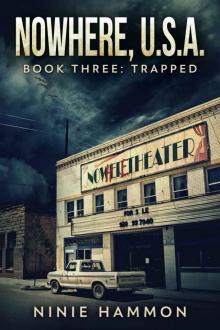 Trapped (Nowhere, USA Book 3)
Trapped (Nowhere, USA Book 3)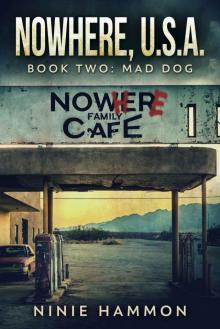 Mad Dog (Nowhere, USA Book 2)
Mad Dog (Nowhere, USA Book 2) Black Water
Black Water Nowhere USA: The Complete Series: A Psychological Thriller series (Nowhere, USA)
Nowhere USA: The Complete Series: A Psychological Thriller series (Nowhere, USA)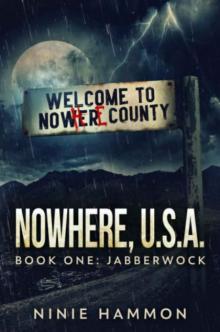 The Jabberwock
The Jabberwock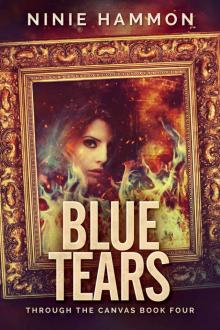 Blue Tears
Blue Tears Blown Away (Nowhere, USA Book 6)
Blown Away (Nowhere, USA Book 6)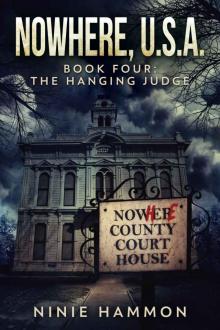 The Hanging Judge (Nowhere, USA Book 4)
The Hanging Judge (Nowhere, USA Book 4) Sudan: A Novel
Sudan: A Novel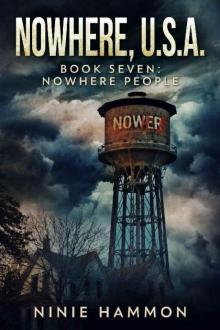 Nowhere People (Nowhere, USA Book 7)
Nowhere People (Nowhere, USA Book 7)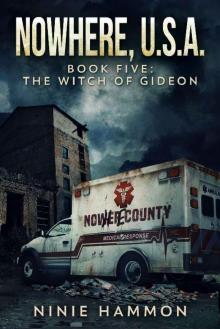 The Witch of Gideon (Nowhere, USA Book 5)
The Witch of Gideon (Nowhere, USA Book 5) Red Web
Red Web Gold Promise
Gold Promise All Their Yesterdays
All Their Yesterdays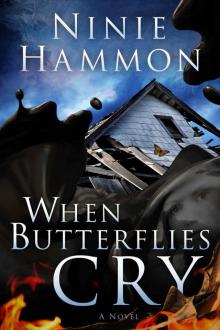 When Butterflies Cry: A Novel
When Butterflies Cry: A Novel Home Grown: A Novel
Home Grown: A Novel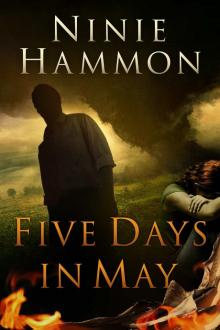 Five Days in May
Five Days in May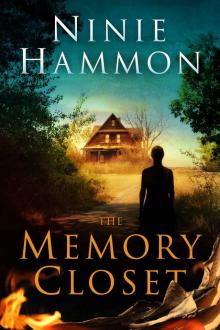 The Memory Closet
The Memory Closet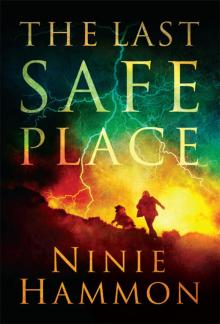 The Last Safe Place
The Last Safe Place The Knowing Box Set EXTENDED EDITION: Exclusive New Material
The Knowing Box Set EXTENDED EDITION: Exclusive New Material